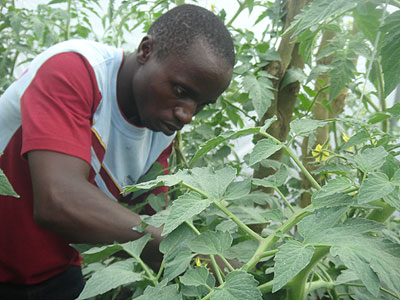Not many people would expect disabled people to make their presence count especially in situations that purposely suit their able bodied colleagues. But one cooperative has defied the odds and clearly demonstrated that disability is not inability.


Not many people would expect disabled people to make their presence count especially in situations that purposely suit their able bodied colleagues. But one cooperative has defied the odds and clearly demonstrated that disability is not inability. This is the Impuhwe Cooperative, which is composed of over 50 members who lost various body parts during the liberation struggle in 1994. The cooperative, which is based in Kanombe Sector Gasabo District deals in growing of vegetables, maize and beans. The coop was founded in 2009 with just Rwf400,000 from member contributions.The president of the cooperative, John Ndekezi, says that the inspiration behind establishing the cooperative was to help members to earn some extra money and ultimately overcome their ordeal. He says the cooperative currently employs three permanent staff as well as 30 casual employees. Each of them earns an average of Rwf100,000."We came here in 2008. We survived on a Rwf50,000 monthly government stipend which was inadequate. We decided to establish the cooperative to supplement our incomes. We suffer from physical disability but not a mental disability,” Ndekezi says.Ndekezi reveals that the Ministry of Defense donated to them the 33 hectares of land, 21 hectares of which are already under cultivation."We were unable to cultivate the land ourselves due to our disability. We employed able bodied people,” he says. "The cooperative has really been helpful both in terms of monetary value as well as improving nutrition among members,” he says. Last season, the cooperative earned Rwf3.7 million from maize harvests, using 5.5 hectares of land compared to Rwf2.3 million on 10 hectares the previous season. The chairman blamed the latter on poor rains. "We opted to concentrate on vegetables following advice from the district. We also have three green houses of tomatoes that will be harvested next month. We also have onion seeds which we are also growing on over five hectares,” Ndekezi disclosed."Unlike other agricultural based cooperatives where members do all the work including planting to harvesting, we are compelled to use some of our savings to employ able-bodied people,” he explains.Another challenge facing the cooperative are delays in carrying out its activities and failure to sell produce on time.According to the chairperson, access to bank loans has also been a barrier to the development of the cooperative. The cooperative recently requested for a loan of Rwf5 million from a local financial institution, but that was quickly rebuffed. "It is difficult for farmers to get a loan due to lack of collateral,” he laments.Ndekezi says that lack of means to transport perishable produce to markets is also an impediment to the cooperative’s growth. He concludes that in order to enhance productivity, the cooperative needs to mechanise its agricultural activities to ensure progress but acknowledges this is a tall order. Despite its various challenges, the cooperative has accumulated over Rwf1,5million on its account.


